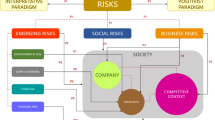Abstract
This article emphasizes the role of projects and project management in assuring socially responsible acting of contemporary business systems, presenting some practical applications in the field of tourism. With arising number of projects in business systems and their growing strategic importance, the role of project management has radically been changing for the last two decades. Managing organizations, as a central topic among seven crucial topics in ISO 26000 on social responsibility, is strongly associated with managing projects. Projects have important influence on the established as well as on establishing ongoing operations and are important tools in assuring business systems’ strategic development, by exposing interdependences and supporting the requisitely holistic approach. This article tries to fill the gap we detected in literature on social responsibility where projects and project management seem not to have a proper role. Four different links and interdependencies between project management and systems theory (which ISO 26000 reinforces) are exposed: (1) systemic treatment of project management, (2) systematical treatment of projects as holistic works, (3) systemic treatment of projects as parts of BSs’ strategies, (4) systemic treatment of projects throughout their entire life cycle.


Similar content being viewed by others
Notes
They are formally or legally independent, but naturally and economically needing each other, hence interdependent because they complete each other by differences, such as mutually different specialists at work.
References
Anbar FT (1985) A systems approach to project evaluation. Proj Manag J 16(3):21–26
Atkinson R (1999) Project management: cost, time and quality, two best guesses and a phenomenon, its time to accept other success criteria. Int J Proj Manag 17(6):337–342
Atkinson R, Crawford L, Ward S (2006) Fundamental uncertainties in projects and the scope of project management. Int J Proj Manag 24(8):687–698
Bertalanffy vL (1979) General system theory: foundations, developments, applications, Revised edition. Sixth Printing George Braziller, New York
Botkin DB, Keller EA (1995) Environment science: earth as a living planet. Wiley, New York
Bredillet CN (2009) Mapping the dynamics of the project management field: project management in action—Part 2. Proj Manag J 40(2):2–6
Duh M, Belak J, Milfelner B (2010) Core values, culture and ethical climate as constitutional elements of ethical behaviour: exploring differences between family and non-family enterprises. J Bus Ethics 97(3):473–489
Fleming QW, Koppelman JM (1998) Earned value project management: a powerful tool for software projects. J Def Softw Eng 6:19–23
Hameri AP, Heikkilä J (2002) Improving efficiency: time-critical interfacing of project tasks. Int J Proj Manag 20(2):143–153
Hauc A (2007) Projektni management. GV Založba, Ljubljana
Hauc A, Vrečko I, Barilović Z (2011) A holistic project-knowledge society as a condition for solving global strategic crises. Društvena istraživanja 20(4-114):1039–1060
Hodgson D (2002) Disciplining the professional: the case of Project Management. J Manag Stud 39(6):803–821
ISO (2010): ISO 26000. See: http://www.iso.org/iso/discovering_iso_26000.pdf
Kerzner H (1979) Project management: a systems approach to planning, scheduling and controlling. Van Nostrand Reinhold, New York
Lock D (2007) Project management, 9th edn. Gower, Burlington
Močnik D, Širec K (2010) The determinants of internet use controlling for income level: cross-country empirical evidence. Inf Econ Policy 22(3):243–256
Mulej M (1974) Dialektična teorija sistemov in ljudski reki. Naše gospodarstvo 21(3–4):207–212
Mulej M (1979) Ustvarjalno delo in dialektična teorija sistemov (Creative Work and the Dialectical Systems Theory). Razvojni Center, Celje
Mulej M, Espejo R, Jackson M et al (2000) Dialektična in druge mehkosistemske teorije (podlaga za uspešen management). Univerza v Mariboru, Ekonomsko-poslovna fakulteta, Maribor
Mulej M (2007) Systems theory—a worldview and/or a methodology aimed at requisite holism/realism of humans’ thinking, decisions and action. Syst Res Behav Sci 24(3):347–357
Mulej M, Kajzer Š (1998) Ethics of interdependence and the law of requisite holism. In: Rebernik M, Mulej M (eds) STIQE ‘98. Institute for Entrepreneurship at Faculty of Business Economics, Maribor, pp 129–140
PMI (2008) A guide to the project management body of knowledge, 4th edn. Project Management Institute, Newton Square
Pollack J (2007) The changing paradigm of project management. Int J Proj Manag 25:266–274
Roman DD (1986) Managing projects: a systems approach. Elsevier Science, New York
Shenhar AJ (1998) From theory to practice: toward a typology of project-management styles. IEEE Trans Eng Manag 45(1):33–48
Singh H, Singh A (2002) Principles of complexity and chaos theory in project execution: a new approach to management. Cost Eng 44(12):23–33
Slevin DP, Cleland DI, Pinto JK (2002) The frontiers of project management research. Project Management Institute, Maryland
Tanaka H. (2004): The changing landscape of project management. 4th International project management workshop, ESC Lille
Vrečko I (2011) Obvladovanje strateških kriz z uporabo projektnega menedžmenta kot celovit invencijsko-inovacijski proces: doktorska disertacija. Univerza v Mariboru, Ekonomsko-poslovna fakulteta, Maribor
Wysocki RK (2011) Effective project management: traditional, agile, extreme. Wiley, Indianapolis
Yeo KT (1993) Systems thinking and project management—time to reunite. Int J Proj Manag 11(2):111–117
Author information
Authors and Affiliations
Corresponding author
Rights and permissions
About this article
Cite this article
Vrečko, I., Lebe, S.S. Project Management Supports (Requisitely) Holistic: Socially Responsible Action in Business Systems. Syst Pract Action Res 26, 561–569 (2013). https://doi.org/10.1007/s11213-013-9304-x
Published:
Issue Date:
DOI: https://doi.org/10.1007/s11213-013-9304-x




